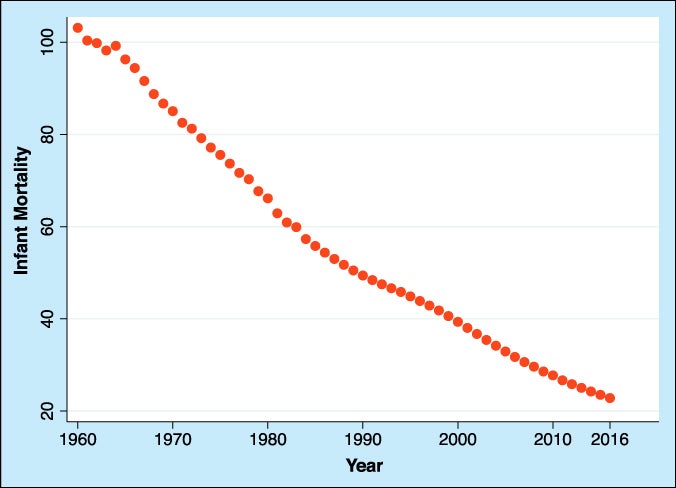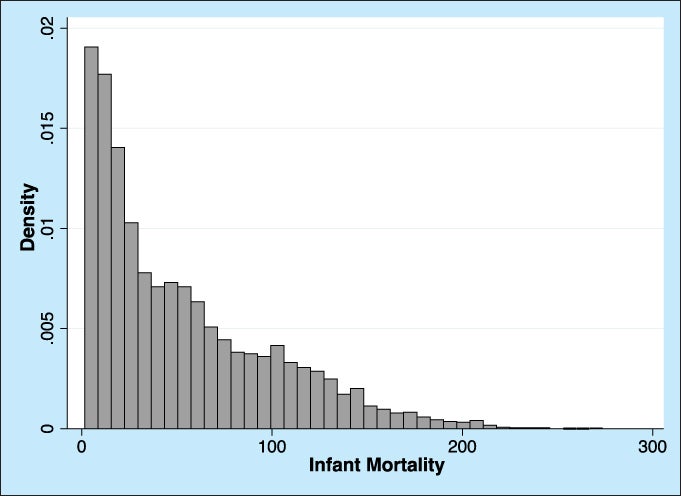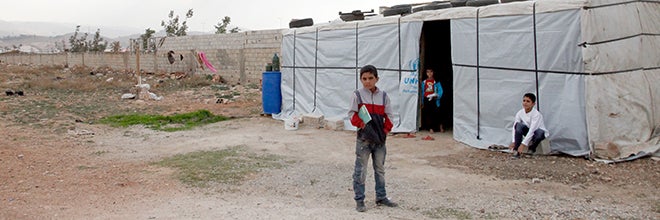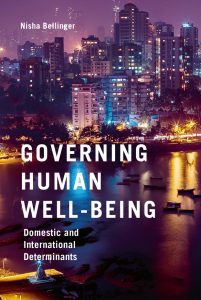

Nisha Bellinger is an Assistant Professor of Political Science in the School of Public Service at Boise State University. She completed her Ph.D. in Political Science from the University of Missouri in 2012. Her research focuses on the political determinants of human well-being outcomes. She has published a book titled Governing Human Well-Being: International and Domestic Determinants and journal articles in European Political Science Review, Human Rights Review, International Political Science Review, Party Politics, Journal of International Relations and Development, and Journal of Politics.
Why are there large disparities in the quality of life people lead? What are the factors that account for the general well-being of mankind? How do we improve human lives? These questions are substantively important as they are policy relevant.

Political factors play a particularly important role in influencing well-being of the citizenry. A prominent indicator of human well-being that is commonly used in the political science literature is infant mortality, which refers to the number of infant deaths per thousand live births. Not only does infant mortality capture infants’ health but it is also indicative of well-being of the poorer strata of society, where infant mortality rates are especially likely to be higher.
Figure 1: Yearly Average Infant Mortality Rates, 1960-2016

Figure 2: Global Variations in Infant Mortality Rates, 1960-2016
My recently published book accounts for these disparities by assessing the role of domestic political determinants (political representation and governance) and international political determinants (globalization and conflict) in influencing human well-being outcomes such as infant mortality. In my book, I test the effect of the four political determinants on well-being through statistical analyses on a global sample of countries supplemented with several case narratives, with the results showing how the impact each of these determinants has on a range of well-being outcomes. Below I provide brief discussions about each determinant, in turn.
POLITICAL REPRESENTATION
I conceptualize political representation to capture the extent to which different groups within society are able to influence policy-making. Political representation in this context refers to the presence of multiple political parties where a country with a higher number of political parties is more representative in nature compared to a country with fewer political parties. I argue that countries with higher levels of representation are more inclusive and more competitive in nature and are associated with better well-being outcomes. A more inclusive political system with multiple parties enables diverse swaths of society to convey their needs and preferences to the decision-makers and policies formulated in such a society are better able to encompass the interests of different groups. Moreover, it also creates an environment of negotiation, compromise, and cooperation among political parties to work together.
A less representative system with fewer parties, on the other hand, is not as inclusive and may only represent the interests of select groups within society. Consider the case of Sweden. Sweden has a multiparty system and has one of the lowest levels of infant mortality in the world with an infant mortality rate of 2 in 2016. Sweden has a large welfare state, which incorporates the needs of multiple segments of society. For instance, allowances are given to families with children, there are programs for mothers through subsidies, parental and paternity leaves are available that extend benefits to both parents, and adequate childcare support is provided by the government, among others. These policies benefit the populace at large and are difficult to dismantle today given the vast support for the policies among the people. The Social Democrats played an important role in building the welfare state in Sweden and they have been able to do so in a multiparty system environment working with other political parties.
A better-represented system with multiple parties also signals the presence of a more competitive system, which provides incentives for all representatives to perform better to ensure their political survival. In less competitive systems incumbents may lack the motivation to perform well in office if they do not face alternative challengers who could potentially replace them. One could argue that too much representation could hamper the decision-making process where alternative representative groups may take an intransigent stand, making it difficult to formulate important policies that could improve welfare outcomes. Indeed, conflict is two competing objectives: better representation versus prompt decision-making. However, the advantages of a better-represented society could outweigh the potential adverse consequences of too much representation because the electorate can replace poor-performing incumbents who fail to satisfy the most basic health needs of their supporters.

GOVERNANCE
Governance primarily refers to the way authority is exercised by government officials who play an important role in pursuing developmental objectives as they are involved in the formulation and implementation of a variety of welfare policies. I conceptualize governance through three fundamental attributes: bureaucratic quality, corruption, and rule of law where “good governance” refers to high-quality bureaucracy, low levels of corruption, and a strong rule of law. I argue that good governance collectively improves societal well-being.
High-quality bureaucracy embodies meritocratic recruitment and political autonomy of bureaucrats, ensuring selection of capable individuals who are able to perform their tasks without interference from political officials. Japan’s bureaucracy serves as a good example of high-quality bureaucracy, which is based on meritocratic recruitment and an autonomous bureaucracy. Both these features can be traced to the Meiji era, which was initiated in the 1860s and remain prevalent in contemporary times. Japan has achieved commendable levels of human well-being as indicated by a low infant mortality rate of 2 in 2016. The bureaucracy has been especially proactive in improving well-being outcomes where the Ministry of Health and Welfare and the Ministry of Labor played an important role. The Ministry of Health and Welfare took the initiative and sent policy-makers to western countries to adopt and adapt welfare policies to domestic needs. They initiated the Angel Plan, which had similarities with policies in the EU and included better maternity and parental leaves, better support for workers with children, and raising the age for universal child care from 3-7 years in 2000 to 15 years in 2009, among others.
Corruption, on the other hand, refers to the pursuit of personal interest by government officials and can have a detrimental effect on human well-being. One plausible way public officials can indulge in corrupt practices is by influencing the price of government goods and services; either driving up the price of welfare provisions for the citizens or by stealing the provisions from the government – both forms of corruption may adversely affect human well-being by reducing the availability of essential health provisions and making them more expensive. For instance, in Tanzania, bribes extracted from the health sector reduced the availability of health care for the poor as it drove up prices, depriving individuals of essential welfare provisions.
Finally, rule of law refers to impartiality or equal applicability of law to all. In so far as the rule of law is impartial, it ensures a vigilant system that holds the violators of law accountable, including government officials. A strong rule of law can minimize corrupt behavior and enhance responsiveness and accountability among government officials. Good governance is a holistic concept such that high-quality bureaucracy, low levels of corruption, and a strong rule of law collectively present an environment that is associated with better human well-being outcomes.

GLOBALIZATION
I assess the effect of three aspects of globalization on human well-being outcomes. Economic globalization refers to increased flows of capital, goods, and services across international boundaries. Social globalization refers to the spread of ideas, norms, and cultures across borders as well as greater informal interaction among the states through international tourism, media, and other forms of information exchange. Lastly, political globalization refers to the extent to which states are engaged with the international community, as evidenced by actions such as joining international organizations, participating in UN missions, entering into international treaties, and establishing embassies in foreign countries. The consequences of globalization have been a contentious issue among scholars where each of these three aspects of globalization have contradictory effects.
The consequences of globalization, however, can be varied depending on the outcome of interest. I argue that all three aspects of globalization improve well-being outcomes. One of the aspects of economic globalization is greater trade and trade in essential drugs can improve health outcomes by increasing their accessibility to those in need around the world. Social globalization can educate people in ways that can improve human well-being. The role of the media is especially significant since it strongly facilitates the transmission of information about the latest developments in health-related medicines and services, such as knowledge about vaccines, antibiotics, and other related research. A particularly striking example is the way that Pasteur’s discovery of germs in 1873 led to a 20th-century revolution in health as states and societies increasingly understood the importance of clean water. One of the aspects of greater political globalization is association with international organizations that are more unequivocally a positive force for human well-being, namely the United Nations and its subsidiary organizational bodies such as the UNDP, UNICEF, the World Food Program, and many others that primarily focus on the promotion of human well-being. It is noteworthy that these international organizations also play a high-profile role in advocating on behalf of developing countries.
CONFLICT
Conflicts can adversely influence human well-being in many different ways. Existing research demonstrates that conflicts may drive states to divert resources away from productive areas that enhance human well-being, adversely affect the economic performance of countries embroiled in conflicts, deteriorate the quality of infrastructure, and hamper trade between countries. All these mechanisms could adversely affect the quality of human lives by reducing the availability of resources that are necessary to improve human well-being outcomes. Conflicts can be especially harmful for one of the most vulnerable segments of population, children. For instance, Burundi’s civil war adversely influenced health outcomes among children specifically.
Conflicts often displace large proportions of population within countries. As of 2015, over 38 million people had been internally displaced due to armed conflict and violence and almost 77% of IDPs (internally displaced people) live in 10 countries, namely, Syria, Colombia, Iraq, Sudan, DR Congo, Pakistan, South Sudan, Somalia, Nigeria, and Turkey. IDPs often live in a precarious environment and may not have access to basic necessities such as housing, food, clean water, health services and provisions, which are necessary to maintain a standard quality of life.
Conflicts can also adversely affect neighboring states in the form of a refugee influx. Consider the ongoing conflict in Syria where as of January 2nd, 2018, the total number of registered Syrian refugees is about 5,481,262, which includes 2 million registered refugees in Egypt, Iraq, Jordan, Lebanon, 3 million in Turkey, and over 30,000 in Northern Africa. An inflow of refugees often puts pressure on host governments’ resources. Funding that could be diverted to address health, education, and other general welfare needs of the citizens may need to be diverted to address the immediate concerns of the refugee population. This may adversely affect well-being of the populace in the host states as well as the refugee population.

POLITICS MATTERS: POLITICAL DETERMINANTS OF HUMAN WELL-BEING
This article addresses the three opening questions. It identifies some of the factors that can account for existing disparities in human well-being. Both domestic and international political determinants play an important role. Political representation and governance help us understand the political dynamics within countries while globalization and conflicts shed light on the political dynamics between countries and well-being outcomes. This research has important policy implications as it can help us identify some of the ways in which we can improve human lives.
